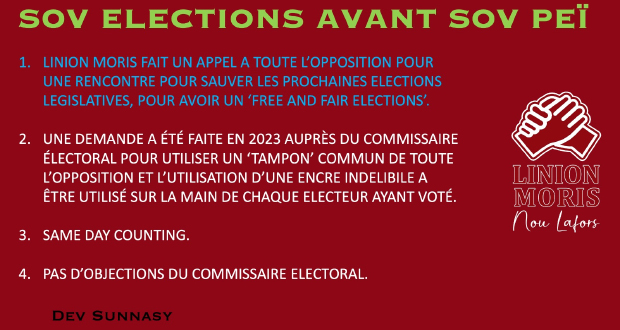Publicité
This Election Calls for Strategic Voting
Par
Partager cet article
This Election Calls for Strategic Voting

Generally, voting can be tradition-based, policy-based or strategic-based.
Traditional voting is when we vote for a particular person, party or alliance simply because we have always voted for that person, party or alliance or because our parents or ancestors have always voted for them. We follow tradition. We may not necessarily know the issues or policies at stake but we already know who we will vote for beforehand.
Policy-based voting implies looking at and analyzing the various proposals and policies being presented by the competing parties or alliances such as reducing poverty, creating new jobs, cuts or increases in education, etc., and voting for the party whose policies and proposals best meets our particular needs and wishes at this particular point of our lives.
Strategic voting is voting with an end goal in mind. It implies going through the mental process of sifting through the priorities, issues and proposals from all competing parties and understanding the main issue at stake, being clear about one’s position on it and then voting for the party that represents our position and conviction on the main issue at stake.
It is important to note that with strategic voting, liking a politician or party is secondary, what is primary is the core issue at stake and assessing which party best represents our own conviction on that issue. Strategic voting often entails putting aside personal preferences or sacrificing a lesser good for a higher good in order to achieve the desired end result. It implies flexibility, deliberate choices, compromises and is calculating in nature.
Strategic voting is often used in elections that have an all important issue at stake, where outcomes of an election are likely to have a life-changing impact for a country as a whole. An example of strategic voting is in our own 1967 elections - voters had a clear end goal in mind, either they were for or against independence as proposed and voted accordingly.
So why does this election call for strategic voting? Or, why is strategic voting the most appropriate or best approach for the next coming election?
Precisely because at stake in this election is a controversial core issue that implies profound changes for our country. This core issue is that of ‘constitutional reform’, as proposed by the PTr/MMM alliance. Do we want the next government to change our constitution to grant additional powers to the President and to establish a 2nd republic or not? This is the core, bottom line issue that our vote will fundamentally and ultimately count for.
As voters, we cannot be ignorant on this central, core issue since the two main alliances have made their platforms very clear on this one core issue. The AUM wants to change the constitution once in office and the AL wants to keep the constitution as it is and not change it. The ball is now in our court as voters. Directly or indirectly, this is what we are voting on.
What about all the new and smaller parties?
It is clearly a good thing for Mauritius that many groups and newly formed parties are now more aggressively present in the political arena thus giving the electorate more options. These new parties represent new blood, fresh ideas and potential to bring innovative changes for restructuring our political system for the better. The political landscape of the last 46 years has served its purpose, Mauritius is ready to transition to a fresh and new understanding of power and politics that can radically transform our society for the better, and it’s the new parties that stand the best chances to herald in this ‘renouvellement.’
The emphasis however, needs to be placed on ‘transition’. This will not happen overnight, clearly not in this upcoming election. Rather, the next 5 years will be fertile ground for new parties to groom themselves to be real alternatives to the then outgoing 2020 government.
As far as this election is concerned, the strategic questions to ask are - how will voting for one of the new, smaller parties impact on the core, central issue at stake? How will it make a difference to the desired outcome, either for or against the proposed 2nd republic?
Please note, we are talking in the context of THIS election only. I for one, believe in the role of new parties and it might well be strategically wise to vote for the new parties in 2020 but the question remains - is it for this election in the light of the main issue at stake?
To arrive at an answer, we pose the obvious question - Can any of the new or smaller parties win this election on their own in order to be in a position to either implement or negate the proposed 2nd republic? The answer is clearly no. To vote for a small party and have our vote count on the 2nd republic issue, either for or against, this is a necessary pre-requisite. Otherwise, our vote for them will have a null and void effect on the 2nd republic issue.
Therefore, if we hold, as we should, that voting on the 2nd republic is crucial, logically then, the small parties are not an option in this election. Like it or not, in order for our vote to count on the 2nd republic issue, we are limited in this election to only 2 choices, either AUM if we are for or AL if we are against, since they are the only two candidates that can win this election and hence be in power to implement or negate the 2nd republic proposal.
Accordingly, those who are against the 2nd republic and yet plan to vote for AUM or a small party are left in an irrational position (i.e. believing one thing and yet acting in contradiction to it). Among those are Mr. Somduth Dulthumun of MSDTF, several socio-cultural organizations and many of the leaders and members of new, smaller parties themselves.
Further, voting strategically in this election requires that we view all other campaign issues (more jobs, etc.) as secondary in order to address the primary issue at stake.
Those criticizing the call not to vote for the smaller parties in THIS election (we are not talking about all elections) are missing this strategic aspect and point.
Strategically, the AUM is not against people voting for small parties (for them a vote for a small party is a vote less for AL, their real adversary). It also explains why AL (the underdog in this election) is aggressively advising against it (for them, a vote for a small party by a voter who is against the reform is a vote wasted). Those leaders understand the role of strategy in an election and in voting. We should too. Let’s get over our ignorance and naivety once and for all.
According to the recent poll conducted, well over 60% of the population are against the proposed 2nd republic. At face value, this means that AL should win this election since they are the alliance against the notion. If they do not win, it will not be because the majority of Mauritians agree with the 2nd republic nor because AL did not conduct a good electoral campaign. We have evidence to know that both these propositions are incorrect. Rather, it will be because 1) AUM had certain advantages not available to AL (e.g. MBC), 2) many Mauritians were not smart enough to understand this strategic aspect of voting or 3) they understood it but still wasted their votes by not voting properly for various reasons.
Reason no 1 is beyond our control but reasons no 2 and 3 are clearly within our control.
A strategic approach to voting in this election essentially requires us to: 1) be well informed on the primordial issue at stake, 2) determine which party or alliance best represents our personal views and convictions on that issue and 3) ensure that our votes count on the primordial issue at stake. It implies the exercise of our thinking faculty and our personal judgment. To vote otherwise is, in my opinion, not good sense, not rational and not strategic.
Publicité
Les plus récents






